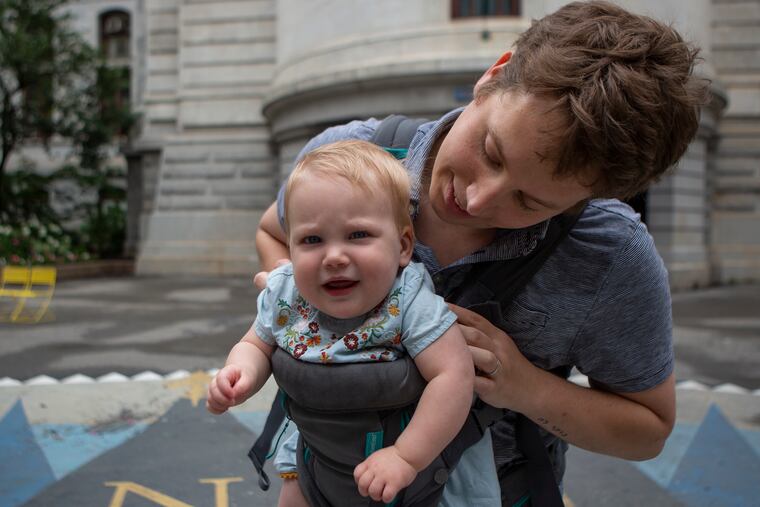I’m not Super Dad, but because I’m a man, the world treats me like one | Perspective
Fathers, we do less, receive praise for the little we do, and even get a pay raise for it.

Babies always get sick at the most inconvenient times. It’s as if they know somehow and plan for it. When I got a call from day care on March 19 saying that 1-year-old Mara had a fever, it was the most inconvenient time.
It was the day before Philadelphia’s infamous Horn & Hardart coffee-can draw of ballot positions for the May primary election. I was compiling a list of contact information for all the campaigns as preparation for election coverage. The event is a gold mine. On this one day, all campaigns are in the same room in City Hall at the same time.
Mara woke up on the day of the Horn & Hardart draw the happiest child in the world — you’d never guess she’d had a fever the night before. But she couldn’t go back to day care until she was fever-free for 24 hours.
It seemed silly to either ask my wife to miss a day of work in the hospital, or for me to miss the opportunity to get the contacts of so many campaigns when Mara wasn’t even sick. The solution was obvious: Mara would join me to do some reporting.
I strapped her to my chest in her carrier and walked to City Hall. It never crossed my mind that I was doing something that could reflect poorly on me in a professional setting. It was inconvenient, sure, but nothing more. When I arrived at City Hall, the feedback I got confirmed that this wasn’t a bad decision.
“This is the best look,” a campaign staffer told me. Members of City Council who — rightfully so — usually ignore me when we pass one another in the corridors of City Hall paused to wave at baby Mara and ask questions about her.
Being a father was an asset, not a liability — and I walked back home feeling like Super Dad. I wasn’t surprised. Not because I am super dad, but because this is my everyday experience walking around the world as a man with a baby.
I learned very early on in parenthood that women have a different experience.
When Mara was about a week old, my wife and I went out for lunch for the very first time with her and some friends. My wife was pushing the stroller. It was the first sunny day after a snowstorm. Mara was covered from head to toe — a onesie, socks, swaddle, hat, blanket. Aside from her eyes, nose, and mouth, she was covered completely and seemed perfectly content. Waiting to cross the street, an older woman went up to my wife and told her: “Your baby is cold.”
My experience pushing a stroller around the streets of Philadelphia is dramatically different. More than once, Mara was fussy on the way back home. She was in her stroller crying. I was wearing headphones, listening to a podcast. An older woman tapped me on the shoulder to tell me I’m doing a great job.
I experienced similar reactions to Mara crying in restaurants, bars, trains, and airplanes. No matter how ineffective my attempts to soothe her are, people react positively and with sympathy.
We’ve all seen this scenario when the caretaker isn’t a man. I can just hear someone muttering between their teeth “control your child” to a woman.
While being a father is a social asset, being a mother is a social liability. That disparity has very tangible implications that go far beyond whether people are kind to you on the street. Michelle Budig, a sociology professor at the University of Massachusetts-Amherst, found that men get a 6 percent pay bump when they become parents. Women, on the other hand, get a 4 percent pay cut for each child.
According to the Pew Research Center, even as the educational gap between men and women is shrinking and more women are working, mothers spend exponentially more time every week than fathers on house chores and child care. Another Pew poll found that while 70 percent of Americans think the best thing for a man with young children is to work full time, only 12 percent think it’s ideal for a woman. And 33 percent think a woman with young children shouldn’t work at all. “The optimistic tale of the modern, involved dad,” psychologist Darcy Lockman wrote in May for the New York Times, “has been greatly exaggerated.”
In our patriarchal society, women are expected to choose between their career and parenthood. When a woman takes her kid to day care, she is shamed for not staying home with them. When a man takes his kid, he’s a saint for helping out — a super dad.
Fathers, we do less, receive praise for the little we do, and even get a pay raise for it. Every day for us is Father’s Day.
This year, instead of taking another day off from parenting on Father’s Day, ask the mothers in your life how you can be more supportive, knowing the feedback that they get is very different from the feedback you get. And be the first to volunteer to take the day off next time your kid is sick — you might even get a raise for it.